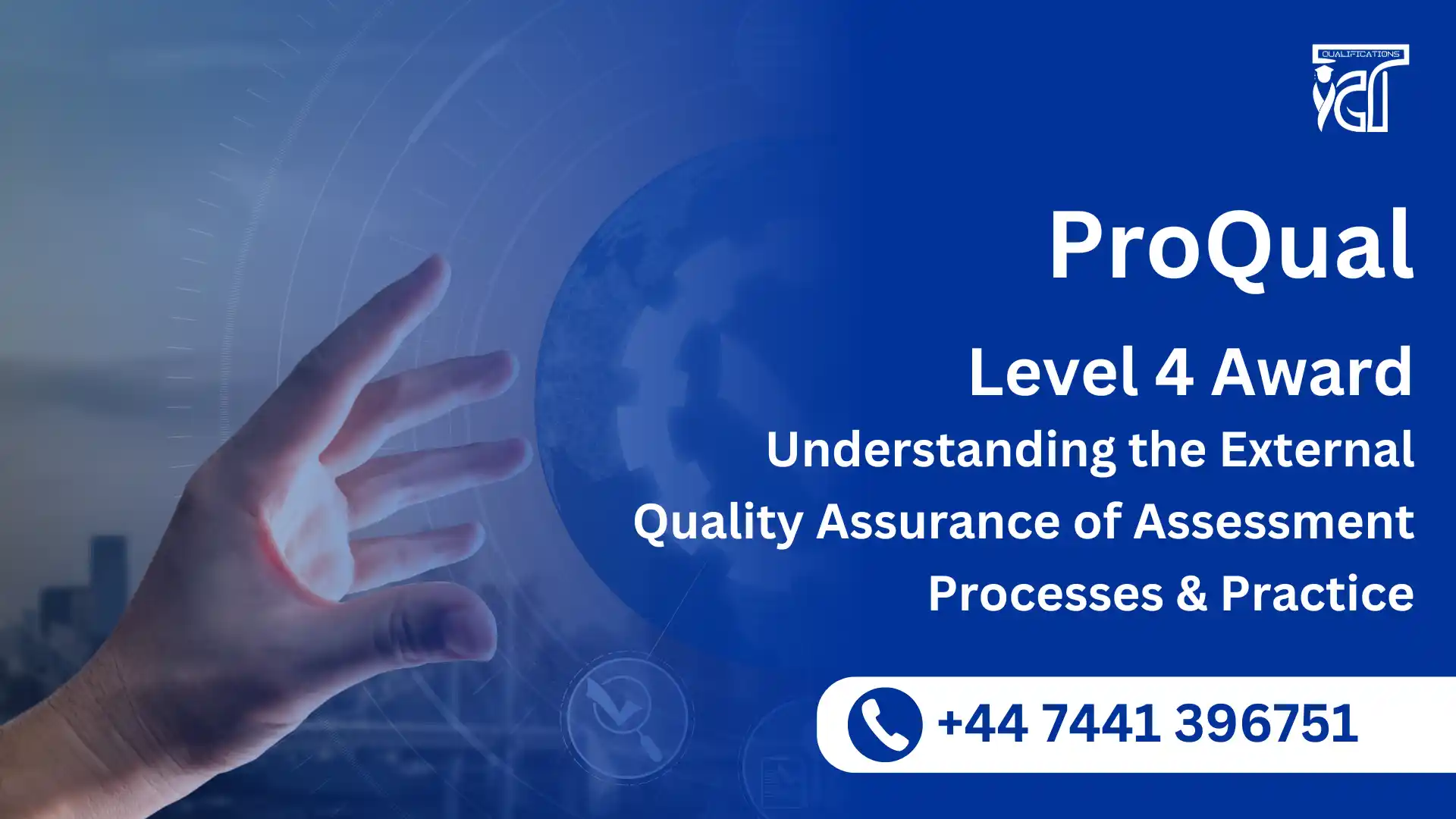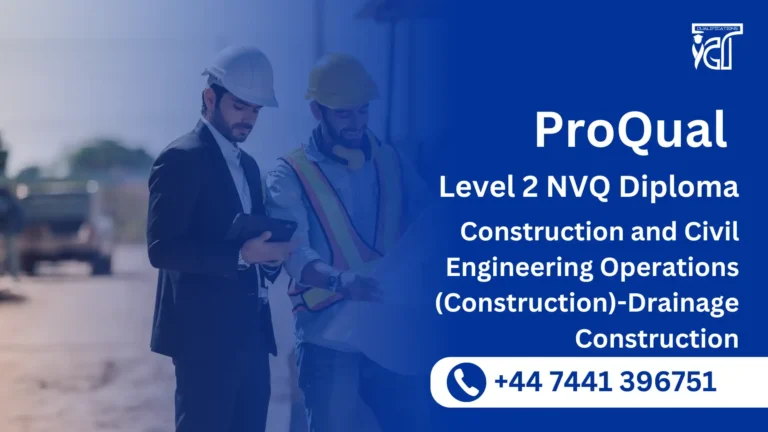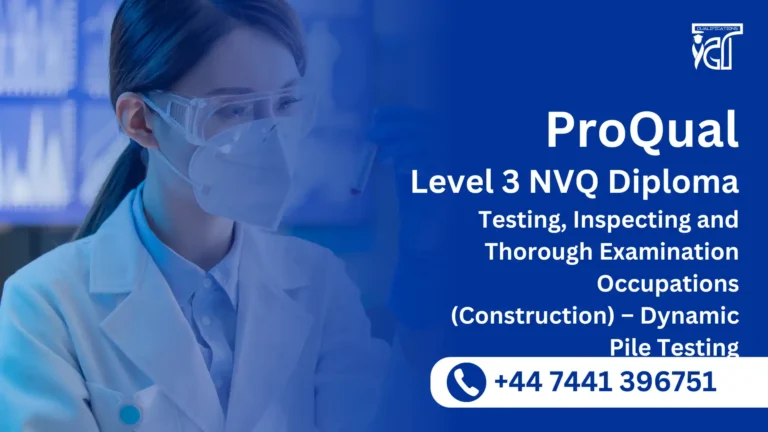The field of quality assurance plays a crucial role in ensuring that education and training assessments are fair, consistent, and aligned with national standards. The ProQual Level 4 Award in Understanding the External Quality Assurance of Assessment Processes and Practice is designed to provide a comprehensive theoretical foundation for individuals who want to learn about external quality assurance (EQA) without the need to demonstrate practical application. This qualification is ideal for professionals aiming to understand the principles, policies, and responsibilities associated with external quality assurance in vocational and academic settings.
The ProQual Level 4 Award in Understanding the External Quality Assurance of Assessment Processes and Practice is a knowledge-only qualification, which means it focuses solely on the theoretical aspects of external quality assurance. Learners do not need to be currently working as an EQA or have access to a live assessment environment. This makes it a perfect option for individuals preparing to move into EQA roles, as well as those in management, compliance, or education-related consultancy who need a strong understanding of external quality systems.
One of the main advantages of this qualification is that it allows individuals to gain formal recognition and knowledge of external quality assurance without the requirement to carry out practical EQA activities. This makes it highly accessible to a wider audience, including those who are aspiring to become EQAs, professionals preparing for a career change, and those who work in related fields such as curriculum development, compliance, or training delivery.
The course enhances your understanding of how assessments are monitored across organizations and how quality is maintained in accordance with Ofqual or other regulatory standards. It also improves your ability to work collaboratively with assessors, IQAs, and awarding bodies, even if you’re not directly involved in assessment practice. Employers also value this qualification for staff involved in internal audits, standardization planning, or quality compliance roles.
Moreover, because this is a Level 4 qualification, it demonstrates a higher level of knowledge and professionalism, which can strengthen your CV and open up opportunities in education, training, and assessment-related sectors.
The ProQual Level 4 Award in Understanding the External Quality Assurance of Assessment Processes and Practice is an ideal qualification for professionals who want to deepen their knowledge of external quality assurance without the requirement of practical fieldwork. It provides a solid theoretical base, supports career development, and opens doors to further qualifications and professional roles within the education and training industry.
ProQual Level 4 Award in Understanding the External Quality Assurance of Assessment Processes and Practice
This qualification consists of one mandatory unit having 60 TQT and 45 GLH. Candidates must complete the mandatory unit to complete this qualification. There are no optional units.
- Understanding the Principles and Practices of Externally Assuring the Quality of Assessment
GLH (Guided Learning Hours) and TQT (Total Qualification Time) are terms commonly used in vocational qualifications to help define the amount of time a learner is expected to spend on their studies.
1. GLH (Guided Learning Hours)
GLH refers to the number of hours a learner spends being directly taught, supervised, or supported during their course. This includes the time spent in activities such as:
- Classroom instruction
- Practical workshops
- One-on-one tutoring or mentoring sessions
- Online learning sessions with tutor support
In other words, GLH represents the time that learners are actively engaged with their instructors or learning activities.
2. TQT (Total Qualification Time)
TQT represents the total amount of time a learner is expected to invest in completing a qualification, including:
- GLH (Guided Learning Hours): Time spent on direct learning, as explained above.
- Self-Directed Learning: This includes time spent on independent study, research, assignment completion, preparation for exams, and any other work the learner does outside of direct teaching hours.
TQT is a broader measure that includes all the time required to achieve the qualification. It helps learners and employers understand the overall commitment required for the qualification.
Key Differences Between GLH and TQT:
- GLH focuses on direct learning with guidance or supervision.
- TQT includes GLH as well as independent study time and other learning-related activities.
Example:
If a qualification has a TQT of 600 hours and a GLH of 250 hours, it means the learner should spend 250 hours in direct learning (classroom, online, or tutor-led sessions) and 350 hours on independent study or research.
Upon completing this Course students will be able to:
Understanding the Principles and Practices of Externally Assuring the Quality of Assessment
- Understand the context and principles of external quality assurance.
- Understand how to plan the external quality assurance of assessment.
- Understand how to manage information relevant to the external quality assurance.
- Understand how to externally evaluate the quality of assessment and internal quality assurance.
- Understand the legal and good practice requirements relating to external quality assurance.
The ProQual Level 4 Award offers a specialised and strategic understanding of external quality assurance (EQA) within vocational education and training environments. It is designed for professionals who wish to develop or formalise their knowledge of external quality assurance processes without being required to carry out actual EQA activities as part of the qualification.
This qualification not only enhances theoretical understanding but also strengthens professional competence, providing a credible foundation for roles in quality assurance, assessment leadership, and education consultancy. Below are the key benefits aligned with Occupational Standards for Education (OSE):
Professional Recognition and Career Progression
Gain Formal Recognition of Your Expertise
- Attain a nationally recognised qualification that validates your understanding of external quality assurance.
- Demonstrates to employers and awarding bodies your commitment to high standards in assessment practice.
Enhance Career Opportunities in Quality Assurance
- Opens up pathways to roles such as External Quality Assurer (EQA), Quality Consultant, or Lead Verifier.
- Supports progression to higher-level qualifications in quality assurance, education leadership, or assessment design.
Deepened Understanding of Quality Assurance Principles
Master the Concepts that Underpin Robust Assessment Systems
- Gain a comprehensive understanding of validity, reliability, consistency, and authenticity in assessment processes.
- Understand how quality assurance impacts learner outcomes and organisational performance.
Understand EQA’s Role in Maintaining National Standards
- Learn how external quality assurance ensures assessment integrity across training providers.
- Appreciate how EQA supports continuous improvement and regulatory compliance.
Improved Professional Confidence and Competence
Build Confidence in Dealing with Centres and Providers
- Develop the skills to evaluate assessment systems and provide informed feedback.
- Improve your ability to challenge poor practice constructively and support quality enhancement.
Strengthen Ethical and Legal Awareness
- Understand your professional responsibilities within a legal and regulatory framework.
- Recognise and respond to issues such as malpractice, bias, and non-compliance.
Increased Value to Employers and Awarding Organisations
Become a Key Asset in Quality Improvement
- Equip yourself to contribute to internal and external audits, inspections, and standardisation events.
- Enhance your organisation’s compliance, credibility, and learner satisfaction.
Support Organisational Development and Efficiency
- Help streamline assessment and verification processes through a better understanding of quality assurance systems.
- Support the development of policies, procedures, and training for assessors and IQAs.
Flexible and Accessible Learning for Working Professionals
Designed to Fit Around Existing Commitments
- Ideal for assessors, IQAs, or trainers seeking to upskill while continuing in their current roles.
- Offers flexible delivery models, including distance learning and blended options.
No Practical EQA Evidence Required
- Suitable for those who need the theory behind EQA without having to demonstrate practice in the field.
- A strong foundation for those considering transitioning into EQA roles in the future.
Alignment with Educational and Industry Standards
Meet National Occupational Standards in Quality Assurance
- Aligns with the requirements of Ofqual and the QCF/RQF frameworks.
- Ensures relevance to current industry practices and expectations.
Prepare for Further Qualifications or Specialised Roles
- Forms a stepping stone to qualifications such as the Level 4 Certificate in Leading the External Quality Assurance of Assessment Processes and Practice.
- Useful for individuals preparing to take on quality consultancy, policy writing, or centre management roles.
The ProQual Level 4 Award in Understanding the External Quality Assurance of Assessment Processes and Practice is designed for professionals who want to build knowledge of external quality assurance within the vocational education and training sector. Below is a clear profile of the ideal learner for this course.
Experienced Assessors and Trainers
- Individuals already working as assessors or trainers in vocational education.
- Professionals seeking to broaden their understanding of how external quality assurance ensures fair, valid, and consistent assessments.
Internal Quality Assurers (IQA)
- Those already engaged in internal quality assurance who want to expand their expertise.
- Learners aiming to understand the wider external quality assurance process to complement their existing IQA responsibilities.
Aspiring External Quality Assurers
- Professionals who are considering future roles in external quality assurance with awarding bodies or regulatory organisations.
- Learners who wish to gain a strong theoretical foundation before moving on to practical EQA qualifications such as the ProQual Level 4 Certificate or Diploma.
Education and Training Professionals
- Teachers, lecturers, and training coordinators looking to strengthen their knowledge of assessment standards.
- Individuals responsible for maintaining quality and compliance in vocational training environments.
Professionals Seeking Career Progression
- Those aiming to progress into higher-level quality assurance or compliance roles within awarding organisations or training providers.
- Learners who see this qualification as a stepping stone to more advanced qualifications in external quality assurance.
Motivated Lifelong Learners
- Professionals committed to continuous professional development (CPD) in assessment and quality assurance.
- Individuals who want to gain a competitive advantage in the education and training sector by enhancing their knowledge of EQA principles.
Completing the ProQual Level 4 Certificate in Advanced Fire Risk Assessment opens up a range of exciting progression opportunities for professionals who wish to enhance their career in fire safety, risk management, and health and safety sectors. This qualification not only strengthens your technical knowledge but also demonstrates competence to employers, regulatory bodies, and clients.
1. Academic Progression
After achieving this Level 4 qualification, learners can progress towards higher-level courses and specialised certifications, including:
- ProQual Level 5 Diploma in Fire Safety (Fire Risk Assessment) – builds advanced competence in managing fire risk assessment and fire safety systems in more complex environments.
- ProQual Level 6 Diploma in Occupational Health and Safety Practice – expands your knowledge beyond fire safety to include wider occupational health and safety responsibilities.
- Specialist CPD Training Courses – such as fire safety engineering, evacuation planning, and building fire strategy courses, which allow learners to gain niche expertise.
2. Professional Recognition
This qualification can support progression to professional membership and recognition within the fire safety and health and safety industries:
- Eligibility to apply for membership of professional bodies such as the Institute of Fire Safety Managers (IFSM) or the Institute of Fire Engineers (IFE), subject to their entry requirements.
- Strengthens professional credibility when applying for roles where fire risk assessment competency is a legal requirement.
3. Career Opportunities
Completing this course enhances employability and opens new job roles in both public and private sectors. Possible career routes include:
- Fire Risk Assessor
- Senior Fire Safety Officer
- Health and Safety Advisor with fire safety responsibilities
- Fire Safety Consultant
- Facilities and Compliance Manager specialising in fire safety
Professionals can also work as independent consultants, offering fire risk assessment services to businesses, housing associations, local authorities, and construction companies.
4. Progression into Leadership and Specialist Roles
With this qualification, learners are better positioned to move into supervisory and management roles within fire safety departments, facilities management companies, or health and safety teams. It also serves as a stepping stone for those wishing to specialise further in fire safety legislation, auditing, or consultancy services.
5. Long-Term Development Pathway
This qualification can form part of a longer development pathway, allowing learners to progress from Level 4 to Levels 5 and 6, and eventually towards Chartered Health and Safety or Fire Engineering status. With continuous professional development, candidates may also advance into training and assessment roles, helping others gain fire safety qualifications.
Entry Requirements
To be eligible for this qualification, learners are expected to meet the following entry requirements :
- Minimum Age:
- Learners must be 18 years or older.
- Educational Background:
- No formal academic qualifications are required.
- A good level of literacy, numeracy, and communication skills is expected (equivalent to Level 2 or above).
- Understanding of basic assessment principles is beneficial but not essential.
- Professional Experience (Recommended but not mandatory):
- Ideally suited for individuals with some experience in:
- Teaching or training
- Assessment or internal quality assurance
- Education management or compliance
- Curriculum development or educational consultancy
- Ideally suited for individuals with some experience in:
- Language Proficiency:
- Learners must have sufficient written and spoken English to complete the course content and assessments.
- Technical Requirements (for online study):
- Access to a computer, tablet, or laptop with a stable internet connection.
- Basic IT skills, including the ability to use email, documents, and upload assignments.
Register Now
Qualification Process
Qualification Process for the ProQual Level 4 Award in Understanding the External Quality Assurance of Assessment Processes and Practice
- Self-Assessment:
Begin by evaluating your eligibility to ensure you meet the qualification requirements, including work experience, knowledge, and language proficiency. - Registration:
Complete your registration by submitting the required documents, including a scanned copy of a valid ID, and paying the registration fee. - Induction:
An assessor will conduct an induction to confirm your eligibility for the course and explain the evidence requirements. If you do not meet the criteria, your registration will be canceled, and the fee will be refunded. - Assignments & Evidence Submission:
Provide all assignments and the necessary evidence based on the assessment criteria outlined in the course. If you are unsure of the required evidence, consult with the assessor for guidance on the type and nature of evidence needed. - Feedback and Revision:
The assessor will review your submitted evidence and provide feedback. Evidence that meets the criteria will be marked as “Criteria Met,” while any gaps will be identified. You will be asked to revise and resubmit if needed. - Competence Evidence:
Submit final evidence demonstrating that all learning outcomes have been met. This evidence will be marked as “Criteria Met” by the assessor once it is satisfactory. - Internal Quality Assurance (IQA):
The Internal Quality Assurance Verifier (IQA) will review your evidence to ensure consistency, quality, and compliance with standards. - External Verification:
The IQA will submit your portfolio to ProQual External Quality Assurance Verifiers (EQA) for final confirmation. The EQA may contact you directly to verify the authenticity of your evidence. - Certification:
Upon successful completion of all checks, ProQual will issue your official certificate, confirming that you have attained the ProQual Level 4 Award in Understanding the External Quality Assurance of Assessment Processes and Practice.







